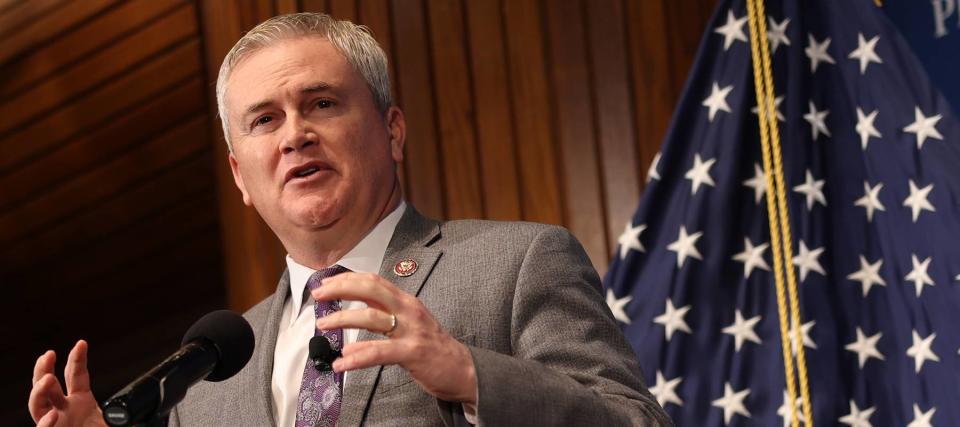'Every American should be outraged': This US watchdog uncovered $5.4 billion in potentially fraudulent COVID-19 loans — obtained using over 69K sketchy Social Security numbers

A U.S. government watchdog issued a “deeply disturbing” fraud alert over the widespread use of “questionable” Social Security numbers (SSNs) to get pandemic loans.
Don't miss
Here's how much the average American 60-year-old holds in retirement savings — how does your nest egg compare?
'Hold onto your money': Jeff Bezos issued a financial warning, says you might want to rethink buying a 'new automobile, refrigerator, or whatever' — here are 3 better recession-proof buys
UBS says 61% of millionaire collectors allocate up to 30% of their overall portfolio to this exclusive asset class
The Pandemic Response Accountability Committee (PRAC) found that 69,323 potentially fraudulent SSNs were used to obtain $5.4 billion from the Paycheck Protection Program (PPP) and the COVID-19 Economic Injury Disaster Loan (EIDL) program.
The shocking revelation dropped just days before a hearing by the Republican-led House of Representatives Oversight Committee on fraudulent pandemic spending was set to begin.
“What PRAC has discovered is deeply disturbing,” said Sens. Rand Paul and Joni Ernst, who are demanding an investigation into COVID-19 loan fraud. “The extent of the fraud could be far greater.”
The U.S. Government Accountability Office released a report earlier this month that found that over the last three years, at least 1,044 individuals pleaded guilty to or were convicted at trial of defrauding relief programs such as PPP abnd EIDL. With hundreds of ongoing investigations and pending cases, the report states that the number of people facing similar charges is only expected to increase.
Suspicious SSNs fell through the cracks
The Small Business Administration (SBA) launched the PPP and EIDL programs in 2020 to help small businesses and their employees recover from the economic impacts of the pandemic.
Over the pandemic, the SBA provided about $800 billion in PPP loans and over $378 billion in EIDL loans — not all of them, it would seem, to deserving businesses and individuals.
But with that much money being distributed in pandemic relief — and so quickly — oversight was a must. And so the CARES Act created PRAC for just that purpose. In a review of more than 33 million PPP and EIDL applications, the committee uncovered 221,427 potentially invalid SSNs.
Of those, 69,323 sketchy SSNs made it through the system and were used in connection with 99,180 successful loan applications, amounting to $5.4 billion that was doled out between April 2020 and October 2022.
A further 175,768 of the red-flag SSNs were used in loan applications that weren't paid out. However, PRAC cautioned that these SSNs “could be used in a future attempt to obtain benefits from other government programs, and therefore warrant further scrutiny.”
To find the suspicious activity, PRAC’s Pandemic Analytics Center of Excellence (PACE) used publicly available Social Security Administration (SSA) data to identify suspicious SSNs, such as those not issued by SSA or those with inaccurate names and dates of birth.
Read more: The US dollar has lost 98% of its purchasing power since 1971 — invest in this stable asset before you lose your retirement fund
Probing pandemic fraud
What made these two programs particularly vulnerable to fraud, PRAC says, was the “elevated urgency” to hand out the funds in a timely manner.
“SBA’s initial approach to implement these programs quickly made billions of dollars available to millions of borrowers affected by the pandemic, but used few program controls to verify applicants’ eligibility prior to disbursing funds,” the committee explained in its fraud alert.
After the announcement, Paul and Ernst sent a letter to Hannibal Ware, Inspector General of the SBA, calling for “more scrutiny” into pandemic relief to assess the “true extent of fraudulent activity” in the government’s pandemic programs.
The senators went on to urge the SBA to work with the Department of Justice to “ensure that fraudsters are held accountable.”
If such an investigation does happen, it wouldn’t be the first examination of how pandemic funds were used. The SBA’s COVID-19 relief programs have already come under fire for how “hundreds of billions of taxpayer dollars spent under the guise of pandemic relief were lost to waste, fraud, abuse and mismanagement,” as House Committee on Oversight and Accountability Chairman Rep. James Comer put it.
The committee opened a hearing earlier this month to probe how taxpayer dollars were used — or in their words “wasted” — in COVID-19 relief programs.
NBC recently reported that while about $2 billion has been recovered so far, some experts are estimating that there's around $250 billion has been lost to COVID-19 relief fraud.
"Every American should be outraged, and they should demand that Congress do something about it,” Comer told NBC.
What to read next
You could be the landlord of Walmart, Whole Foods and CVS (and collect fat grocery store-anchored income on a quarterly basis)
Americans are paying nearly 40% more on home insurance compared to 12 years ago — here's how to spend less on peace of mind
Here's how much money the average middle-class American household makes — how do you stack up?
This article provides information only and should not be construed as advice. It is provided without warranty of any kind.
